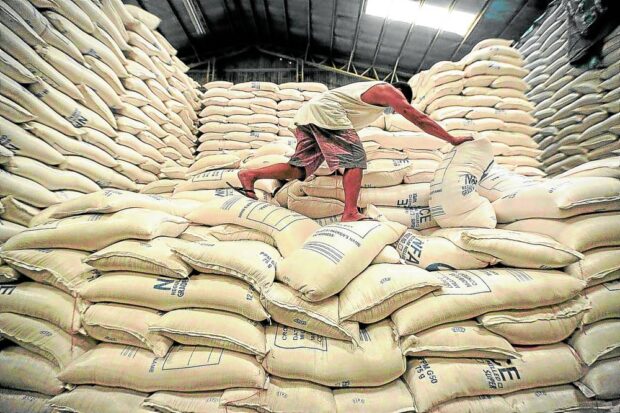Imposing price cap helps stabilize rice prices — lawmakers

RICE STOCKS Sacks of rice are stockpiled at the National Food Authority warehouse in Quezon City in this photo taken in 2020. —FILE PHOTO
MANILA, Philippines — Implementing a price ceiling on rice and conducting warehouse raids contributed to a “subsequent drop in global rice prices,” lawmakers claimed on Sunday.
Last August 29, President Ferdinand “Bongbong” Marcos Jr. directed the Bureau of Customs (BOC) to inspect more rice warehouses and likewise ordered a price ceiling of P41 per kilogram for regular-milled rice and P45 for well-milled rice, which took effect last September 5 under Executive Order 39.
READ: Bongbong Marcos orders price caps for rice at P41 to P45 per kilo
According to Quezon 1st District Rep. Mark Enverga, who chairs the House Committee on Agriculture and Food, the current administration’s decision to impose rice price caps and the recent inspections has helped “stabilize the rice market despite global market uncertainties.”
Citing recent reports, Enverga also disclosed that Vietnam’s rice prices notably declined for two consecutive days last week, which he claimed partly stemmed from the country’s cancellation of rice orders.
“The price of Vietnam’s 5 percent broken rice experienced a notable decrease of 2.3% from September 5 to September 7, reaching $628 per ton. This drop marks the most substantial price decline since India’s ban on non-basmati white rice exports,” Enverga said.
Article continues after this advertisementLikewise, Albay 2nd District Rep. Joey Salceda said the imposed price ceiling helped improve rice trading, pointing out that “India export ban and the specter of an El Niño episode that could hurt local harvest drove rice prices to unreasonable levels, especially with the sufficient supply of the grain domestically.”
Article continues after this advertisement“The cap ended the rice price spike. It is now clear that the soaring cost of the grain is artificial, driven by market speculation, and rice traders driven by greed. We have to manage our rice inventory better to avoid fueling the speculation here and in the global rice market,” Salceda said.
“The global market shift following their intervention is a testament to their ability to navigate complex economic landscapes. It highlights the Philippines’ capacity to influence and contribute positively to international food markets,” he added.
‘Contract growing’
Meanwhile, Ako Bicol Party-list Rep. Elizaldy Co proposed a mechanism called contract growing between the national government and local farmers to help stabilize rice prices in the market.
Co claimed contract growing should involve large agricultural corporations to manage tracts of farmlands to benefit both consumers and farmers.
The lawmaker suggested that a portion or 50 percent of farmers’ yield “would be contracted at a pre-agreed price under the scheme while the remaining yield would be sold at market rates to allow farmers to still capitalize on market price surges.”
However, he pointed out that only the contracted portion from the total yield may grant profit to local farmers, while the remaining portion could result in losses.
“Mas maganda’ yung contract grow-farming na corporation, ‘yung malalaki, ‘yung 4,000 hectares, 5,000 hectares kasi mas madaling i-control ‘yan,” Co explained.
(The contract grow-farming corporation is better. The 4,000 hectares and 5,000 hectares are easier to control.)
“Win-win situation na sige 50 percent contracted and 50 percent may upside ka, so pwede ka rin malugi dun sa 50 percent upside mo,” he added.
(It’s a win-win situation, 50 percent contracted and 50 percent you have an upside, but you could also lose your 50 percent upside.)
The lawmaker assured that in this process, farmers would not be shortchanged.